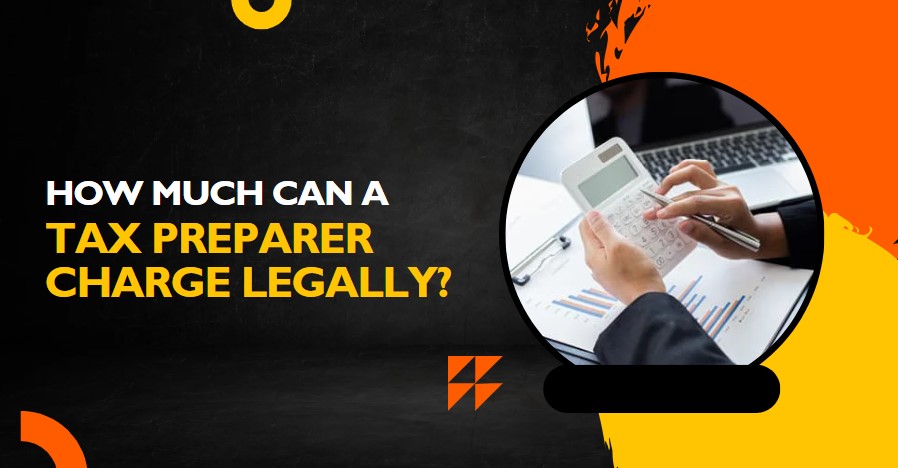How Much Can a Tax Preparer Charge Legally?
Hiring a tax preparer can be a smart decision, especially if your tax situation is complicated or you simply want to avoid the stress of filing taxes yourself. But one question many people ask is: how much can a tax preparer charge legally? It’s an important question, because while you want a good service, you also don’t want to be overcharged or fall into a tax scam.
We’ll break down everything you need to know about legal fees for tax preparation. We’ll go over the rules, what to expect, what factors affect the cost, and how to avoid being charged unfairly. This article is written in simple words so that anyone can understand, even if you’re not familiar with taxes.
What is a Tax Preparer?
A tax preparer is a person or business that helps individuals and businesses file their tax returns. Some tax preparers are certified professionals like CPAs (Certified Public Accountants), Enrolled Agents (EAs), or attorneys, while others may just have training in tax preparation without any formal license. Tax preparers can work for a company like H&R Block, own their own small business, or even work online.
Is There a Legal Limit to What They Can Charge?
The IRS (Internal Revenue Service) does not set a fixed fee that tax preparers must follow. This means there is no legal maximum amount a tax preparer can charge. However, the IRS does have rules about how they charge and what is considered fair and ethical.
Here are some important points:
- Tax preparers can set their own fees.
- Fees must not be based on the refund amount. This is a very important rule. It is illegal for a tax preparer to charge you a percentage of your refund.
- They must give you a clear and honest explanation of their fees before they begin working.
- They must sign your tax return and include their Preparer Tax Identification Number (PTIN).
Types of Fee Structures
There are several common ways tax preparers charge for their services. Understanding these can help you know whether a fee is fair.
| Fee Structure Type | Description |
|---|---|
| Flat Fee | A single set price for completing a tax return, no matter how long it takes. |
| Hourly Rate | The preparer charges based on the time spent on your taxes. Rates vary depending on experience. |
| Per Form Fee | The preparer charges based on how many tax forms are required to complete your return. |
| Minimum Fee + Add-ons | A base fee is charged for basic service, with extra charges added for each additional form or service. |
These pricing methods are legal and acceptable as long as the fee is not based on your refund amount.
What Does the Average Tax Preparer Charge?
Even though there’s no legal maximum fee, it’s helpful to know what others are paying. According to the National Society of Accountants, here’s what tax preparers charge on average:
- $220 to $300 for a standard 1040 with Schedule A (itemized deductions)
- $150 to $200 for a simple 1040 without itemizing
- $400 to $600 or more for more complex returns with business or rental income
These are average prices, and they can vary depending on the location, the preparer’s experience, and how complex your taxes are. For example, in cities or high-cost states, fees may be higher.
What Affects the Cost of Tax Preparation?
Several things can affect how much you are charged for tax preparation. Below are the key factors:
1. Complexity of Your Tax Return
If you only have one W-2 and take the standard deduction, your return is simple and will cost less. But if you’re self-employed, own a rental property, or have investments, your return is more complex and may require extra forms, which cost more.
2. Experience and Qualification
A CPA or tax attorney may charge more than someone who is only a seasonal tax preparer. More experienced professionals often provide more in-depth help.
3. Time of the Year
During tax season, especially in the weeks close to the April deadline, prices can go up. Many preparers raise their rates during busy times.
4. Location
As mentioned earlier, tax preparation fees can be higher in big cities or areas with a higher cost of living.
5. Extra Services
If you want audit support, tax planning advice, or help with back taxes, these services may cost extra.
Are There Any Hidden Fees to Watch For?
Unfortunately, not all tax preparers are honest. Some may try to hide extra fees or charge unfair amounts. Here are some warning signs:
- They refuse to give you a clear quote up front.
- They promise you a very large refund without looking at your documents.
- They ask you to sign a blank tax return.
- They charge a fee based on your refund amount.
These are red flags and may mean the preparer is not following IRS rules. You can report suspicious behavior to the IRS using Form 14157.
Do I Have to Pay Up Front?
This depends on the preparer. Some may ask for payment after the return is completed. Others may ask for a deposit upfront. A few offer Refund Transfer services, where their fee is taken out of your refund. While this might seem convenient, it often comes with extra fees from banks or third-party providers. Be sure to ask for a complete breakdown of costs before agreeing to this option.
How Can You Make Sure the Fee is Fair?
Here are a few smart tips:
- Shop around: Don’t go with the first preparer you find. Call a few and compare their prices and services.
- Check qualifications: Make sure the person has a valid PTIN. You can search the IRS directory online.
- Read reviews: Look online or ask for references.
- Ask for a price list: Some preparers have printed or posted fee lists. This helps you avoid surprise charges.
- Avoid big promises: If someone guarantees a large refund or says they can get you more money than others, be careful.
What If You Can’t Afford a Tax Preparer?
If you have a simple return and earn below a certain amount, you may be eligible for free tax help. Some options include:
- IRS Free File: Available on the IRS website.
- Volunteer Income Tax Assistance (VITA): Offers free tax help for people with low income, seniors, and those with disabilities.
- Tax Counseling for the Elderly (TCE): Focuses on retirement-related tax issues for people 60 and older.
These services are offered by trusted organizations and trained volunteers. They are a great way to save money if you qualify.
Also Read:
Final Thoughts
While there’s no legal cap on how much a tax preparer can charge, the IRS has clear rules in place to protect taxpayers from unfair fees. Understanding how fees work and what to expect can help you avoid being overcharged. Always do your research, ask questions, and make sure your preparer is licensed and honest.
A good tax preparer is worth the cost, especially if you have a complicated return or need expert advice. But you should never feel unsure or in the dark about what you’re being charged. Stay informed, and don’t be afraid to walk away if something doesn’t feel right.
Frequently Asked Questions
How much can a tax preparer legally charge?
There’s no fixed legal limit for tax preparer fees. The IRS allows them to set their own rates, but they must not charge based on your refund amount. Fees should be fair, clearly explained, and agreed to before filing your return. Always ask for a quote in advance.
Is it illegal to charge based on my tax refund?
Yes, it is illegal for a tax preparer to charge you based on how big your tax refund is. This rule helps protect you from dishonest preparers who might change your return to increase their fee. Always choose someone who charges a flat or hourly rate instead.
What affects the cost of tax preparation?
The price depends on how complex your taxes are, how many forms you need, your income sources, and the tax preparer’s experience. It can also vary by location and time of year. More complex returns usually cost more because they take more time to complete.
Can I get free help with my tax return?
Yes, if you earn a low income or are over 60 years old, you may qualify for free services like IRS Free File, VITA, or TCE. These are government-backed programs that help eligible people file taxes without any charge using trained volunteers or easy software.
How do I know if a tax preparer is honest?
Check that they have a valid PTIN (Preparer Tax ID Number), ask for written fees upfront, and avoid anyone promising huge refunds. Read online reviews and check credentials. A trustworthy preparer will answer your questions, explain everything clearly, and never ask you to sign a blank form.


